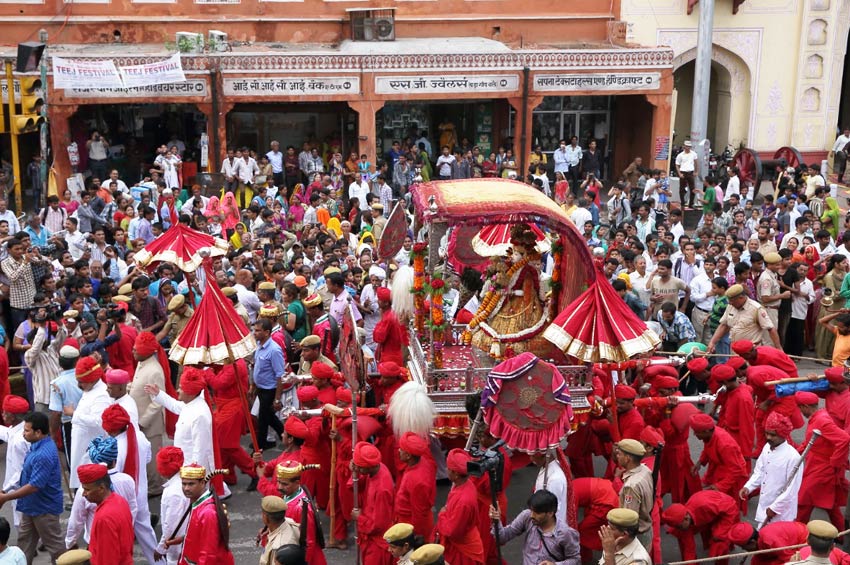
Significance
Teej holds great significance in Hindu mythology, as it commemorates the reunion of Goddess Parvati with Lord Shiva. According to the legends, Goddess Parvati observed intense penance and underwent various hardships to win the affection of Lord Shiva and be reunited with him. It was on the day of Teej that her prayers were answered, and she was blessed to be with Lord Shiva once again.
The festival of Teej is therefore considered auspicious, and it is believed that worshipping Goddess Parvati on this day can bring blessings and fulfillment of desires. Married women especially pray to Goddess Parvati for the well-being and longevity of their husbands, seeking a harmonious and blissful married life. The fasting and rituals observed during Teej are seen as acts of devotion and a way to seek the blessings of the divine.
Teej also symbolizes the rejuvenation of nature and the arrival of the monsoon season. The swinging on beautifully adorned swings represents the joy and celebration of new beginnings. It is a time of joyous festivities, where women come together to celebrate, sing traditional songs, and express their devotion to Goddess Parvati.
Overall, Teej is a festival of love, devotion, and reunion, carrying deep spiritual and cultural significance for the people of Jaipur and Rajasthan. It is a time to seek blessings, celebrate relationships, and embrace the divine grace of Goddess Parvati.
Rituals And Celebrations
Teej is celebrated with great enthusiasm and fervor in Jaipur, Rajasthan. The rituals and celebrations associated with this auspicious festival are filled with joy and traditional customs.
The day begins with married women receiving Sinjara, a gift pack sent by their parents. This pack includes items like bindi, vermilion, henna, bangles, ghevar (a special Rajasthani sweet), and a vibrant lahariya saree. These gifts symbolize the love and blessings of the parents and their wishes for a happy married life. The married women then adorn themselves with henna, jewelry, and the beautiful lahariya saree, adding to the festive atmosphere.
Fairs and processions are an integral part of Teej celebrations. A grand procession starts from the Tripolia Gate of the Pink City Jaipur and makes its way through various markets, culminating at the Chaugan Stadium. The highlight of the procession is the beautifully decorated idol of Goddess Teej, which is prepared by the royal families of Jaipur. The idol is placed on a palanquin made of gold and silver and is accompanied by a grand convoy of decorated elephants, horses, and camels. The procession is a sight to behold, with the rhythmic beats of folk songs and lively folk dances adding to the festive spirit.
The Teej festival is a celebration of love, devotion, and the vibrant culture of Rajasthan. It brings together people from all walks of life to participate in the rituals, enjoy the fairs, and revel in the traditional folk performances. The celebrations of Teej in Jaipur are a magnificent showcase of the rich heritage and royal grandeur of the city, making it a truly memorable experience for locals and visitors alike.
Teej Festival Highlights
- Teej is a significant festival celebrated in Jaipur, Rajasthan.
- Married women receive Sinjara, a gift pack, from their parents, symbolizing their love and blessings.
- Women adorn themselves with henna, jewelry, and lahariya sarees, adding to the festive spirit.
- Fairs and processions take place, starting from Tripolia Gate and ending at Chaugan Stadium.
- The idol of Goddess Teej, beautifully decorated by the royal families, is carried in a palanquin made of gold and silver.
- The procession features decorated elephants, horses, and camels, accompanied by lively folk dances and folk songs.
- The festival showcases the rich culture, heritage, and grandeur of Jaipur.
- It is a celebration of love, devotion, and the vibrant traditions of Rajasthan.
- Teej brings people together to participate in rituals, enjoy fairs, and immerse in the festive atmosphere.
- The festival creates a memorable experience for both locals and visitors, highlighting the spirit of Rajasthan's cultural celebrations.



